This document provides commentary on Isaiah 18 from multiple scholars. It discusses various interpretations of the phrase "shadowing with wings" which describes the land of Cush. Possible meanings discussed include: being shaded by trees, mountains, locusts, ships/sails, or musical instruments like cymbals or sistrums associated with Egyptian gods. The rivers of Cush are debated as referring to branches of the Nile in Egypt or Ethiopia. Overall, the commentary examines linguistic details and provides different scholarly opinions on identifying the land and interpreting this challenging biblical passage.
![ISAIAH 18 COMMENTARY
EDITED BY GLENN PEASE
A Prophecy Against Cush
18 Woe to the land of whirring wings[a]
along the rivers of Cush,[b]
1.BARNES, “Woe to the land - (הוי hoy). This word, as has been already remarked (the
note at Isa_17:12), may be a mere interjection or salutation, and would be appropriately
rendered by ‘Ho!’ Or it may be a word denouncing judgment, or wrath, as it is often used in this
prophecy (the note at Isa_5:8).
Shadowing with wings - (כנפים צלצל tsı le
tsal ke
napaı ym). This is one of the most difficult
expressions in the whole chapter; and one to which as yet, probably, no satisfactory meaning has
been applied. The Septuagint renders it, Οᆒαᆳ γᇿς πλοᆳων πτέρυγες Ouai ges ploion pteruges - ‘Ah!
wings of the land of ships.’ The Chaldee, ‘Woe to the land in which they come in ships from a
distant country, and whose sails are spread out as an eagle which flies upon its wings.’ Grotius
renders it, ‘The land whose extreme parts are shaded by mountains.’ The word rendered,
‘shadowed’ צלצל tsı le
tsal, occurs only in this place and in Job_41:7, where it is translated ‘fish-
spears’ - but as we know nothing of the “form” of those spears, that place throws no light on the
meaning of the word here. The word is derived, evidently, from צלל tsalal, which has three
significations:
(1) “To be shady, dark, obscure;” and hence, its derivatives are applied to anything that
“makes” a shade or shadow - particularly “shady trees” Job_40:21-22; the shades of night
Son_2:17; Son_4:6; or anything that produces obscurity, or darkness, as a tree, a rock, a wing,
etc.
(2) It means “to tingle,” spoken of the ears 1Sa_3:11; 2Ki_21:13; “to quiver,” spoken of the lips
Hab_3:16; and hence, its derivatives are applied to anything that makes a sound by “tinkling” -
an instrument of music; a cymbal made of two pieces of metal that are struck together 2Sa_6:5;
1Ch_15:16; 1Ch_16:42; 1Ch_25:6; 2Ch_5:12; Neh_12:27; Psa_150:5)
(3) It means “to sink” Exo_15:10. From the sense of making “a shade,” a derivative of the verb
צלצל tse
latsal - the same as used here except the points - is applied to locusts because they appear
in such swarms as to obscure the rays of the sun, and produce an extended shade, or shadow,
over a land as a cloud does; or because they make a rustling with their wings.
The word used here, therefore, may mean either “shaded, or rustling, or rattling,” in the
manner of a cymbal or other tinkling instrument. It may be added, that the word may mean a
“double shade,” being a doubling of the word צל tsel, a “shade, or shdow,” and it has been
supposed by some to apply to Ethiopia as lying betwen the tropics, having a “double shadow;”](https://image.slidesharecdn.com/isaiah18commentary-150303115501-conversion-gate01/85/Isaiah-18-commentary-1-320.jpg)
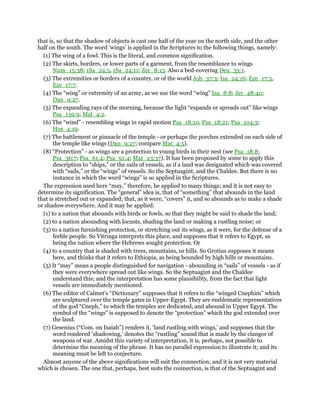
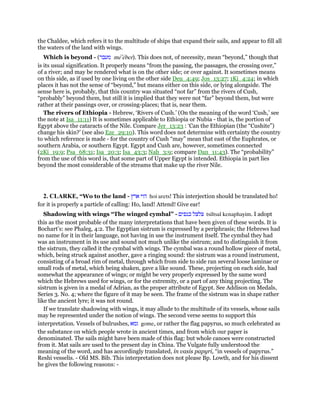
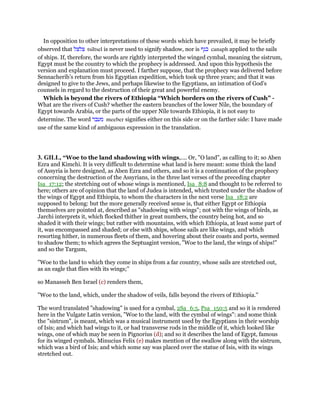

![Isa_18:1-7. Isaiah announces the overthrow of Sennacherib’s hosts and desires the Ethiopian
ambassadors, now in Jerusalem, to bring word of it to their own nation; and he calls on the
whole world to witness the event (Isa_18:3). As Isa_17:12-14 announced the presence of the foe,
so Isa_18:1-7 foretells his overthrow.
Woe — The heading in English Version, “God will destroy the Ethiopians,” is a mistake
arising from the wrong rendering “Woe,” whereas the Hebrew does not express a threat, but is
an appeal calling attention (Isa_55:1; Zec_2:6): “Ho.” He is not speaking against but to the
Ethiopians, calling on them to hear his prophetical announcement as to the destruction of their
enemies.
shadowing with wings — rather, “land of the winged bark”; that is, “barks with wing-like
sails, answering to vessels of bulrushes” in Isa_18:2; the word “rivers,” in the parallelism, also
favors it; so the Septuagint and Chaldee [Ewald]. “Land of the clanging sound of wings,” that is,
armies, as in Isa_8:8; the rendering “bark,” or “ship,” is rather dubious [Maurer]. The armies
referred to are those of Tirhakah, advancing to meet the Assyrians (Isa_37:9). In English
Version, “shadowing” means protecting - stretching out its wings to defend a feeble people,
namely, the Hebrews [Vitringa]. The Hebrew for “wings” is the same as for the idol Cneph,
which was represented in temple sculptures with wings (Psa_91:4).
beyond — Meroe, the island between the “rivers” Nile and Astaboras is meant, famed for its
commerce, and perhaps the seat of the Ethiopian government, hence addressed here as
representing the whole empire: remains of temples are still found, and the name of “Tirhakah”
in the inscriptions. This island region was probably the chief part of Queen Candace’s kingdom
(Act_8:27). For “beyond” others translate less literally “which borderest on.”
Ethiopia — literally, “Cush.” Horsley is probably right that the ultimate and fullest reference
of the prophecy is to the restoration of the Jews in the Holy Land through the instrumentality of
some distant people skilled in navigation (Isa_18:2; Isa_60:9, Isa_60:10; Psa_45:15;
Psa_68:31; Zep_3:10). Phoenician voyagers coasting along would speak of all Western remote
lands as “beyond” the Nile’s mouths. “Cush,” too, has a wide sense, being applied not only to
Ethiopia, but Arabia-Deserta and Felix, and along the Persian Gulf, as far as the Tigris
(Gen_2:13).
6. K&D 1-3, “The prophecy commences with hoi, which never signifies heus, but always vae
(woe). Here, however, it differs from Isa_17:12, and is an expression of compassion (cf.,
Isa_55:1; Zec_2:10) rather than of anger; for the fact that the mighty Ethiopia is oppressed by
the still mightier Asshur, is a humiliation which Jehovah has prepared for the former. Isa_18:1,
Isa_18:2: “Woe to the land of the whirring of wings, which is beyond the rivers of Cush, that
sends ambassadors into the sea and in boats of papyrus over the face of the waters.” The land
of Cush commences, according to Eze_29:10 (cf., Isa_30:6), where Upper Egypt ends. The Seve
neh (Aswan), mentioned by Ezekiel, is the boundary-point at which the Nile enters Mizraim
proper, and which is still a depot for goods coming from the south down the Nile. The nahare-
Cush (rivers of Cush) are chiefly those that surround the Cushite Seba (Gen_10:7). This is the
name given to the present Sennâr, the Meroitic island which is enclosed between the White and
Blue Nile (the Astapos of Ptolemy, or the present Bahr el-Abyad, and the Astaboras of Ptolemy,
or the present Bahr el-Azrak). According to the latest researches, more especially those of
Speke, the White Nile, which takes its rise in the Lake of Nyanza, is the chief source of the Nile.
The latter, and the Blue Nile, whose confluence (makran) with it takes place in lat. 15° 25´, are](https://image.slidesharecdn.com/isaiah18commentary-150303115501-conversion-gate01/85/Isaiah-18-commentary-6-320.jpg)
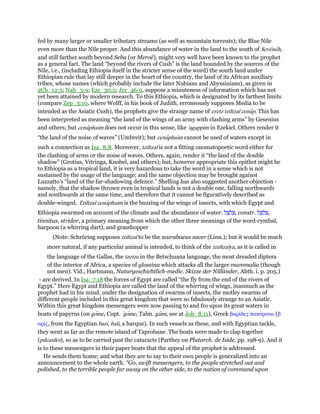







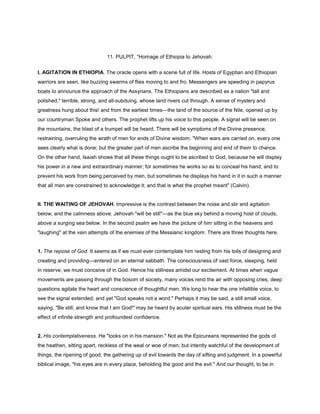


![exercise of human ingenuity, may be made to convey their thoughts to distant lands and remotest times;
there is land and there are seeds, there is sunshine and there is dew, which can be made to produce
golden harvests that will satisfy man's wants and minister to his most refined tastes (Isa_18:4, Isa_18:5);
there are birds and beasts (Isa_18:6), with whose habits men may become intelligently familiar; there is
wealth beneath the soil in precious metals, which can not only be raised and collected to enrich the
homes of men, but which can be conveyed, as the tribute of piety, to the house of the Lord (Isa_18:7).
But, despising and neglecting such materials and such ambitions as these, nations have aspired to rule
over others—have perfected themselves in all the arts and enginery of war, have congratulated
themselves on nothing so much as in being "terrible" to those on the other side the river or across the
mountain range.
II. THE COMPLETENESS OF MAN'S OVERTHROW IN THE DAY OF DIVINE ANGER. The destruction
threatened (Isa_18:5, Isa_18:6) probably refers to that of the army of Sennacherib; but if the reference be
to some other national calamity, it certainly points to an overthrow, signal and fearful, from which the
imagination turns away oppressed. So has it been found, both by individual men and nations, that when
God arises to judgment, their feeble defenses are scattered to the winds, and their doom is utterly
irreversible by anything they can do to mend it (see Psa_2:1-12.; 63:17-20; Psa_92:6, Psa_92:9).
III. THE LESSON OF GOD'S JUDGMENTS. The result in this case is seen in the bringing of a tribute to
the Lord (Isa_18:7). If God puts forth his power in overwhelming retribution, it is, chiefly if not wholly, that
they who witness it (men or nations) may repent of their own misdeeds or impiety, and may return unto
the Lord in penitence, in prayer, in consecration; for the most acceptable "present" that can be "brought
unto the Lord of hosts" is the humbled, believing, obedient heart.
IV. THE PATIENCE OF DIVINE POWER. (Isa_18:4.) The Lord said, "I will fake my rest [I will be calm or
still], I will consider in my dwelling-place [I will look on from my habitation] like a clear heat upon herbs,
like a cloud of dew in the heat of harvest." God will not be provoked into hurried and impatient judgments;
he will retain a Divine composure, he will manifest the patience which belongs to conscious power; the
heavens should be as still as on the calmest summer day while evil was working to its bitter end, while sin
was advancing to its doom. Here is a contrast to us and here are lessons for us. We, in our finite
feebleness, are often impatient in spirit and hurried in action. We are afraid that, if we do not strike at
once, we shall not have time to strike at all, or that our resources of retribution will fall, or that our
adversary will be out of our reach. God can entertain no such fear and be affected by no such thought.
1. All time is at his command.](https://image.slidesharecdn.com/isaiah18commentary-150303115501-conversion-gate01/85/Isaiah-18-commentary-18-320.jpg)

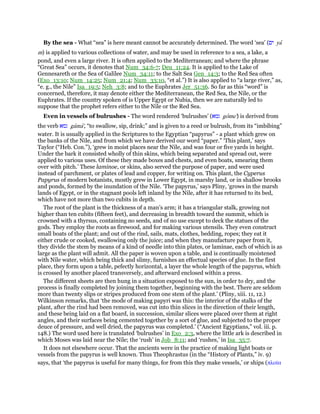

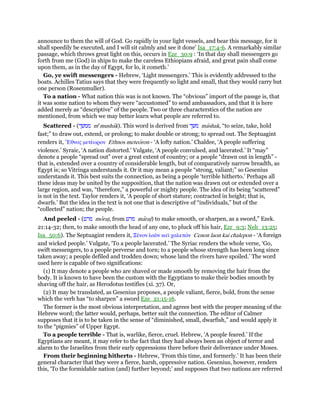
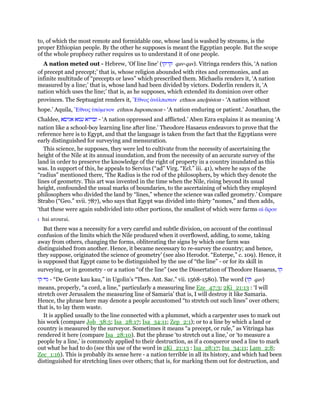



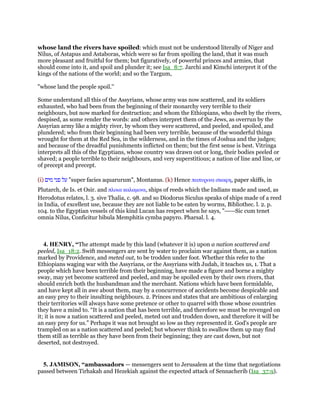
![by ... sea — on the Nile (Isa_19:5): as what follows proves.
vessels of bulrushes — light canoes, formed of papyrus, daubed over with pitch: so the
“ark” in which Moses was exposed (Exo_2:3).
Go — Isaiah tells them to take back the tidings of what God is about to do (Isa_18:4) against
the common enemy of both Judah and Ethiopia.
scattered and peeled — rather, “strong and energetic” [Maurer]. The Hebrew for “strong”
is literally, “drawn out” (Margin; Psa_36:10; Ecc_2:3). “Energetic,” literally, “sharp” (Hab_1:8,
Margin; the verb means to “sharpen” a sword, Eze_21:15, Eze_21:16); also “polished.” As
Herodotus (3:20, 114) characterizes the Ethiopians as “the tallest and fairest of men,” G. V.
Smith translates, “tall and comely”; literally, “extended” (Isa_45:14, “men of stature”) and
polished (the Ethiopians had “smooth, glossy skins”). In English Version the reference is to the
Jews, scattered outcasts, and loaded with indignity (literally, “having their hair torn off,”
Horsley).
terrible — the Ethiopians famed for warlike prowess [Rosenmuller]. The Jews who, because
of God’s plague, made others to fear the like (Deu_28:37). Rather, “awfully remarkable”
[Horsley]. God puts the “terror” of His people into the surrounding nations at the first
(Exo_23:27; Jos_2:9); so it shall be again in the latter days (Zec_12:2, Zec_12:3).
from ... beginning hitherto — so English Version rightly. But Gesenius, “to the terrible
nation (of upper Egypt) and further beyond” (to the Ethiopians, properly so called).
meted out — Hebrew, “of line.” The measuring-line was used in destroying buildings
(Isa_34:11; 2Ki_21:13; Lam_2:8). Hence, actively, it means here “a people meting out, - an all-
destroying people”; which suits the context better than “meted,” passively [Maurer]. Horsley,
understanding it of the Jews, translates it, “Expecting, expecting (in a continual attitude of
expectation of Messiah) and trampled under foot”; a graphic picture of them. Most translate, of
strength, strength (from a root, to brace the sinews), that is, a most powerful people.
trodden down — true of the Jews. But Maurer translates it actively, a people “treading
under foot” all its enemies, that is, victorious (Isa_14:25), namely, the Ethiopians.
spoiled — “cut up.” The Nile is formed by the junction of many streams in Abyssinia, the
Atbara, the Astapus or Blue river (between which two rivers Meroe, the “Ethiopia” here meant,
lies), and the Astaboras or White river; these streams wash down the soil along their banks in
the “land” of Upper Egypt and deposit it on that of Lower Egypt. G. V. Smith translates it,
“Divide.” Horsley takes it figuratively of the conquering armies which have often “spoiled”
Judea.
6. PULPIT, “That sendeth ambassadors; rather, perhaps, messengers, as the word is translated
in Isa_57:9 and Pro_25:13. They are sent, apparently, by the king to his own people. By the sea. "The
sea" must in this place necessarily mean the Nile, which is called "the sea" in Nah_3:8 certainly, and
probably in Isa_19:5. Vessels of papyrus could not possibly have been employed in the very difficult
navigation of the Red Sea. Vessels of bulrushes. That some of the boats used upon the Nile were
constructed of the papyrus (which is a sort of bulrush) we learn from Herodotus (2. 96), Theophrastus
('Hist. Plant.,' 4.9), Plutarch ('De Isid. et Osir.,' § 18), Pliny (Hist. 'Nat.,' 6.22), and Lucan ('Pharsal.,'
4.136). They are represented occasionally on the Egyptian monuments. Saying. This word is interpolated
by our translators, and gives a wrong sense. It is the prophet that addresses the messengers, not the king](https://image.slidesharecdn.com/isaiah18commentary-150303115501-conversion-gate01/85/Isaiah-18-commentary-28-320.jpg)

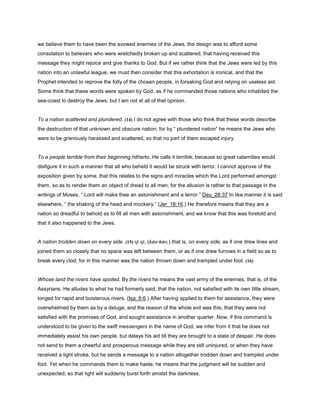

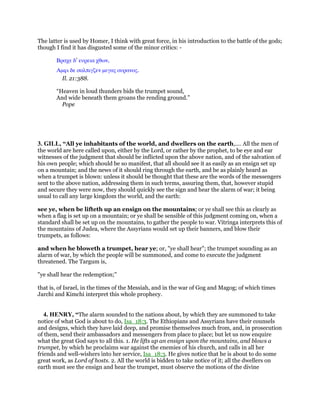



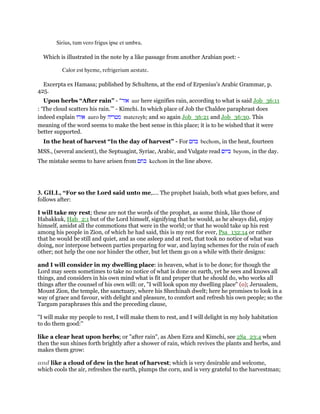
![and both metaphors may signify how grateful is the appearance of God to and for his people, his
presence with them, the light of his countenance on them, and his protection of them; see
Isa_4:5 and so the Targum,
"blessings and consolations will I bring to them quickly, as heat burning by means of the sun,
and as a cloud of dew in the heat of harvest:''
though the whole may be understood in a very different sense, as it is by some, thus; that though
the Lord for a while may seem to take no notice of what is doing below, yet he in heaven beholds
what is done, and looks in a way of wrath and anger upon his enemies, as the sun looks with its
scorching heat upon the herbs, and dries them up; and as a cloud which brings a large dew or
rain with it, which is very hurtful in harvest time; and this sense seems most agreeable to the
context.
4. HENRY, “The assurance God gives to his prophet, by him to be given to his people, that,
though he might seem for a time to sit by as an unconcerned spectator, yet he would certainly
and seasonably appear for the comfort of his people and the confusion of his and their enemies
(Isa_18:4): So the Lord said unto me. Men will have their saying, but God also will have his;
and, as we may be sure his word shall stand, so he often whispers it in the ears of his servants
the prophets. When he says, I will take my rest, it is not as if he were weary of governing the
world, of as if he either needed or desired to retire from it and repose himself; but it intimates
that the great God has a perfect, undisturbed, enjoyment of himself, in the midst of all the
agitations and changes of this world (the Lord sits even upon the floods unshaken; the Eternal
Mind is always easy), and, though he may sometimes seem to his people as if he took not wonted
notice of what is done in this lower world (they are tempted to think he is as one asleep, or as
one astonished, Psa_44:23; Jer_14:9), yet even then he knows very well what men are doing
and what he himself will do.
1. He will take care of his people, and be a shelter to them. He will regard his dwelling-place;
his eye and his heart are, and shall be, upon it for good continually. Zion is his rest for ever,
where he will dwell; and he will look after it (so some read it); he will lift up the light of his
countenance upon it, will consider over it what is to be done, and will be sure to do all for the
best. He will adapt the comforts and refreshments he provides for his people to the exigencies of
their case; and they will therefore be acceptable, because seasonable. (1.) Like a clear heat after
rain (so the margin), which is very reviving and pleasant, and makes the herbs to flourish. (2.)
Like a dew and a cloud in the heat of harvest, which are very welcome, the dew to the ground
and the cloud to the labourers. Note, There is that in God which is a shelter and refreshment to
his people in all weathers and arms them against the inconveniences of every change. Is the
weather cool? There is that in his favour which will warm them. Is it hot? There is that in his
favour which will cool them. Great men have their winter-house and their summer-house
(Amo_3:15); but those that are at home with God have both in him.
5. JAMISON, “take ... rest ... consider — I will calmly look on and not interpose, while all
seems to promise success to the enemy; when figuratively, “the sun’s heat” and “the night dews”
ripen their “harvest”; but “before” it reaches its maturity I will destroy it (Isa_18:5; Ecc_8:11,
Ecc_8:12).
like a clear heat — rather, “at the time of the clear (serene) heat” [Maurer].
upon herbs — answering to “harvest” in the parallel clause. Maurer translates, “in the
sunlight” (Job_31:26; Job_37:21; Hab_3:4).](https://image.slidesharecdn.com/isaiah18commentary-150303115501-conversion-gate01/85/Isaiah-18-commentary-37-320.jpg)

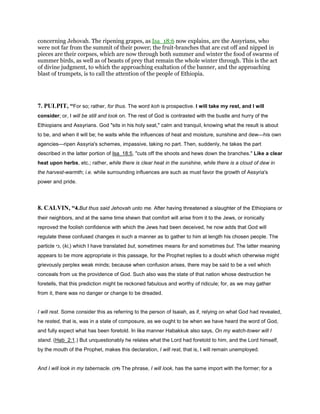

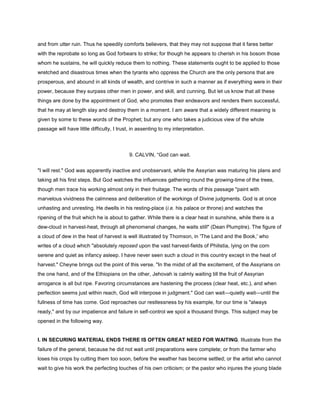
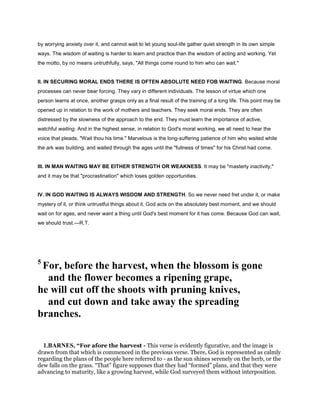


![5. JAMISON, “For — rather, “But.”
perfect — perfected. When the enemy’s plans are on the verge of completion.
sour grape ... flower — rather, “when the flower shall become the ripening grape”
[Maurer].
sprigs — the shoots with the grapes on them. God will not only disconcert their present plans,
but prevent them forming any future ones. Horsley takes the “harvest” and vintage here as
referring to purifying judgments which cause the excision of the ungodly from the earth, and the
placing of the faithful in a state of peace on the earth: not the last judgment (Joh_15:2;
Rev_14:15-20).
6. K&D, “The flower “The blossom” - Hebrews her blossom; נצה nitstsah, that is, the
blossom of the vine, גפן gephen, vine, understood, which is of the common gender. See
Gen_40:10. Note, that by the defective punctuation of this word, many interpreters, and our
translators among the rest, have been led into a grievous mistake, (for how can the swelling
grape become a blossom?) taking the word נצה nitstsah for the predicate; whereas it is the subject
of the proposition, or the nominative case to the verb.
7. PULPIT, “For afore the harvest. God can rest thus tranquil, because he can step in at any time; and
this he is about to do, before Assyria reaps her harvest. When the bud is perfect, etc.; rather, when the
blossom is past, and the green grape is becoming a ripening bunch. He shall cut
off (comp. Isa_10:33, Isa_10:34). The metaphor is slightly varied in this place, to suit the imagery of the
preceding clause, where Assyria has been represented as a vine-stock. Formerly her "boughs" were to be
"lopped;" now her "branches" and "sprigs" or "sprouts" are to be cut away with pruning-hooks.
8. CALVIN, “5.For when the harvest shall be at hand. Literally it is, “ presence of the harvest;” but we
must soften the harshness of the expressions; and it cannot be doubted that the meaning of the Prophet
is, that when the harvest is close at hand, and when the grapes are nearly ripe, the whole produce, in the
expectation of which wicked men had rejoiced, will suddenly be snatched from them. The Prophet
continues the same subject, and confirms by these metaphors what he had formerly uttered, that the
wicked are not immediately cut off, but flourish for a time, and the Lord spares them; but that when the
harvest shall be at hand, when the vines shall put forth their buds and blossoms, so that the sour
grapes make their appearance, the branches themselves shall be cut down. Thus when the wicked shall
be nearly ripe, not only will they be deprived of their fruit, but they and their offspring shall be rooted out.](https://image.slidesharecdn.com/isaiah18commentary-150303115501-conversion-gate01/85/Isaiah-18-commentary-45-320.jpg)


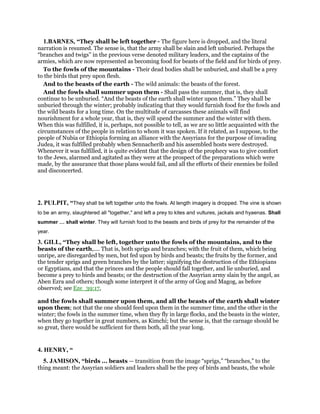


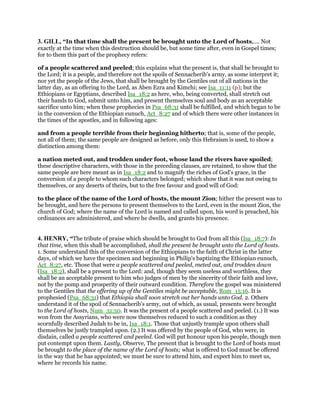
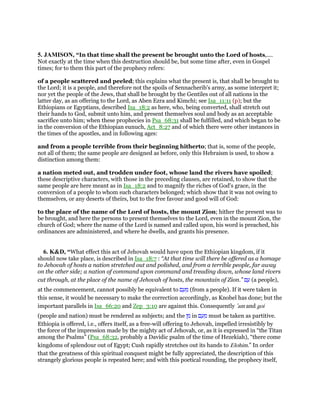
![which was placed as a kind of overture before the following massa Mitzraim when the prophet
collected the whole of his prophecies together, is brought to a close.
7. PULPIT, “In that time shall the present be brought; rather, a present. It would not be at all
improbable that Tirkakah should, after the destruction of Sennacherib's army, send a gift to the temple of
the Jews, either as a recognition of the miracle as wrought by Jehovah, or simply as a thank offering.
Necho sent the armor in which he had fought at Megiddo to the temple of Apollo at Branchidae, near
Miletus, as a thank offering (Herod; 2.159). We have, however, no historical record of Tirkakah's present
as sent. Of a people; rather, from a people (compare the next clause, which supplies the ellipse of the
preposition). (For the rest of the verse, see notes onIsa_18:2.)
8. CALVIN, “7.In that time. The Prophet again shews why he threatened the destruction of a heathen
nation; for when almost all the nations had leagued together against the Church, it appeared as if the
Church were utterly ruined, and therefore Jehovah declares that in due time he will render assistance.
Had he not opposed such designs, and seasonably restrained the attacks of enemies, the Jews would
have despaired; and on this account he shews that he takes care of the Church, and that though he
determines to chastise it, still he comes forward at the proper season to hinder it from perishing, and
displays his power in opposition to tyrants and other enemies, that they may not overthrow it or succeed
in accomplishing what they imagined to be in their power. In order therefore to excite them to patience, he
not only distinguishes them from the Ethiopians, but likewise reminds them that God mitigates his
judgments for their preservation.
A present shall be brought. He alludes to the second verse of this chapter, [Isa_18:2,] in which we have
seen the same names and descriptions applied to the Jewish nation, and he employs the
word brought because they would first of all be led into captivity, so that it would not be more practicable
for them than for foreign nations to go up into the temple.
From a people. This expression deserves notice, for ,מעם (mĕă) means that it will not be an entire nation;
as if he had said, though you must be reduced to a small number, so as to be a feeble remnant, yet those
few who are left will be offered in sacrifice to God. Hence we ought to learn a doctrine highly useful and
exceedingly adapted to our times, for at the present day the Church is not far from despair, being
plundered, scattered, and every where crushed and trodden under foot. What must be done in straits so
numerous and so distressing? We ought to lay hold of these promises, so as to believe that still God will](https://image.slidesharecdn.com/isaiah18commentary-150303115501-conversion-gate01/85/Isaiah-18-commentary-53-320.jpg)

